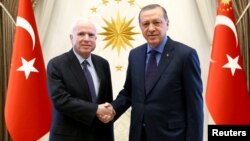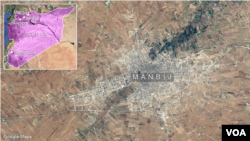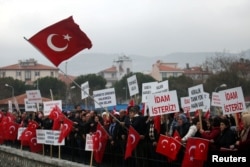Turkish President Recep Tayyip Erdogan has declared his nation's forces will liberate the Syrian town of Manbij from the Kurdish YPG and hand it back to local Arabs.
Ankara accuses the YPG of being affiliated with the Kurdistan Workers Party, or PKK, which is fighting the Turkish state and is designated a terrorist organization by the United States and much of the international community.
Any move, however, against Manbij threatens to put Ankara and Washington on a collision course. “It would put Turkey against American-supported forces who are fighting with America against ISIS,” says political columnist Semih Idiz, of Al Monitor website. “ISIS is a major target for America at the moment and that would really be a disaster, as far as Turkish-American relations are concerned.”
Analysts concerned
The Syrian Kurdish militia is a key part of the U.S.-backed SDF coalition marching on the so-called Islamic State's self-declared capital of Raqqa.
Analysts warn any attack on Manbij could compromise that operation, given that elements of the YPG would likely withdraw to defend Manbij.
Erdogan accuses Washington of reneging on its promise to ensure the YPG would withdraw after it liberated Manbij from Islamic State. The YPG insists it did withdraw and only local people are defending the town.
Some experts are expressing alarm at the prospect of such a confrontation. “It does not make any sense at all, militarily, politically, ideologically, logically, does not make sense. I mean It is a built up area; why should the Turkish army move into this built up area and risking huge casualty rates; why?” says former Turkish Brigadier General Haldun Solmazturk, who now heads the Ankara-based research group the 21st Century Turkey Institute.
A political move?
The Turkish army has been hit with a series of purges within it ranks, since a failed coup in July, that are being cited as a factor into why the military remains bogged down after weeks of fighting to oust Islamic State from the town of al-Bab, which is much smaller than Manbij.
The failings of the Free Syrian Army, which Ankara originally planned to lead the fight against IS, is also cited as a factor behind the ongoing struggle in al-Bab. “The Free Syrian army itself did not prove capable of doing anything unless Turkish armed forces take the lead,” said analyst Aydin Selcen, a former senior Turkish diplomat who served widely in the region.
Turkish domestic politics could be behind an operation against Manbij.
“They (Erdogan and his government) have made foreign policy so much a part of their domestic political calculations,” observes International relations expert Soli Ozel of Istanbul's Kadir Has University. Erdogan is aware cracking down on the YPG plays well with Turkish nationalists whose votes he is courting in an April referendum to extend his presidential powers.
Ozel voiced concerns about overreach. “I am not really sure they are aware, that circumstances have changed, that Turkey doesn't really look as strong as it used to be and its hand is not as strong.”
The threat to move on Manbij could be a high stakes gamble in forcing Washington's arm. “I personally don't think the Turkish side can move in that direction anyway,” suggests columnist Idiz. “I think they are looking for a negotiated deal with the American side, but whether this is possible is not clear.”






